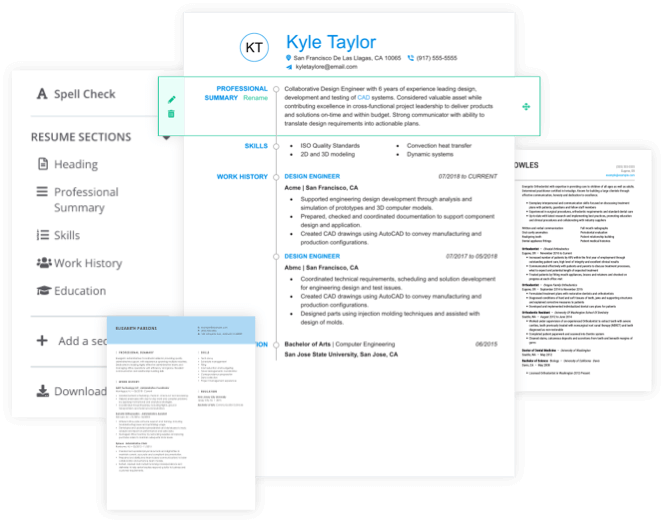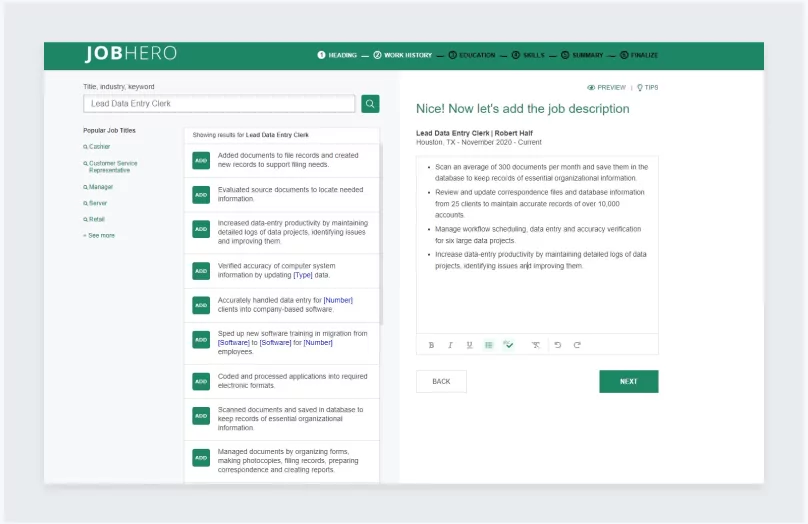- Featured in:

Medical interpreters provide medical translation services to non-English speakers. They help patients communicate with medical staff, doctors, and nurses. Medical interpreters work for many types of medical facilities like physician offices, nursing homes, rehabilitation facilities, and mental health clinics. Some are employed by interpretation agencies, while others operate their own interpretation businesses. Work is typically done in a clinical setting, but some interpreters work in a home-care environment. This position often requires employees to work outside of regular working hours due to the nature of the medical field.
Need cover letter guidance? Add a cover letter to your resume using our cover letter formats how-to guide and add value to your resume.
Boost your resume with an extra click. Our cover letter templates match our resume templates’ designs for a cohesive application. Use a template in our builder to help you quantify and expand upon the experience from your resume and impress employers.
Medical Interpreter Duties and Responsibilities
While a medical interpreter’s day-to-day duties and responsibilities are determined by where they work, there are many core tasks associated with the role. Based on our analysis of job listings, these include:
Translate Medical Information
The main task of a medical interpreter is to interpret and translate complex medical information to patients who speak a foreign language. They ensure the complete understanding of medical information between doctors, nurses, medical staff, and patients. They translate a wide range of medical information that includes medical conditions, treatment options, follow-up appointment details, billing, and insurance. They also accompany patients to office visits and provide drug information.
Translate Medical Text
Medical interpreters translate medical documents like slides, books, and lectures in a clinical setting, and also assist patients with understanding and filling out paperwork. They also translate patient documents from doctors who speak a foreign language.
Establish Positive Interactions
The medical interpreter is the communication link between a doctor and patient, and they strive to provide a positive and relaxed experience so patients feel comfortable disclosing sensitive information about their medical conditions. Sometimes cultural misunderstandings happen between patients and doctors, and the medical interpreter does their best to avoid those situations.
Assist with Patient Follow-Up
Medical interpreters help with patient follow-up as necessary. They assist patients on the phone with follow-up phone calls and check-ins, contact patients to remind them of appointment times, and accompany patients on follow-up office visits.
Participate in Continued Training
All medical professionals need to participate in continued training to stay on top of new medical information to keep or renew their license. Knowledge of new medical terminology is important for effectively translating information.
Maintain Patient Confidentiality
While serving to bridge the language barrier between patients and doctors, medical interpreters must uphold patient confidentiality in accordance with hospital or office policies and procedures.
Medical Interpreter Skills and Qualifications
A good medical interpreter is more than just a skilled linguist; they’re compassionate listeners who are dedicated to making experiences as comfortable as possible for those involved. The following skills are essential to getting the job done:
- Fluency in a foreign language - medical interpreters need to be fluent in at least one foreign language that is frequently spoken by patients that visit the facility they work for
- Knowledge of medical terminology - an up-to-date knowledge of medical terminology and procedures is essential to communicate with doctors, nurses, and medical staff, and to relay that information correctly to the patient
- Translation - translation skills are important for a medical interpreter to accurately transfer tone, style, and cultural elements of information from one language to another
- Interpersonal skills - good interpersonal skills are a prerequisite for this job, as medical interpreters need to connect to and interact with people from different cultural backgrounds
- Communication skills - medical interpreters must be good at listening, speaking in a clear and respectful manner, and interpreting nonverbal communication and body language
- Phone etiquette - phone calls are often a large part of the medical communication process, and medical interpreters need excellent telephone etiquette to do their jobs effectively
Medical Interpreter Education and Training
Minimum requirements for medical interpreter jobs usually include at least a one-year medical interpreter certification program that covers medical terminology, ethics, intercultural communication, and interpreting fundamentals. Some professionals earn four-year college degrees in a foreign language with a concentration in interpreting studies or specialized courses in medical interpretation. Most medical interpreters hold a certification or licensure in interpretation or translation.
Medical Interpreter Salary and Outlook
According to the Bureau of Labor Statistics (BLS), the field of interpreters and translators, which includes medical interpreters, is projected to grow 18 percent by 2026, which is much faster than average. The BLS reports translators and interpreters earn a median annual salary of $47,190. The lowest 10 percent of these workers earn $25,620, while the highest 10 percent earn more than $82,290.
Full-time medical interpreters employed by hospitals, clinics, and medical offices typically receive benefits packages that include health insurance, retirement plans, and paid vacation days.

Helpful Resources
If a career in medical interpretation sounds like something you’d love to do, you’re in luck! We’ve scoured the internet for the most helpful resources to get you started on the career path of your dreams:
The National Board of Certification for Medical Interpreters
NBCMI helps people on the path to becoming medical interpreters by offering a credentialing program with high standards that is compliant with regulatory guidelines
"How to Become a Medical Interpreter (Credentials, Training, and Certification)"
successful freelance medical interpreter Geri McClymont covers everything you need to know about this fastgrowing occupation, including how to get started
The International Medical Interpreters Association
IMIA provides resources on education, ethics, standards, and advocacy for the medical interpretation profession in the U.S. and internationally
How to Earn a Living as a Medical Interpreter
this helpful book is geared towards bilingual people who want to make a living helping people in the medical field as an interpreter
Medical Interpreter Resume Help
Explore these related job titles from our database of hundreds of thousands of expert-approved resume samples:




